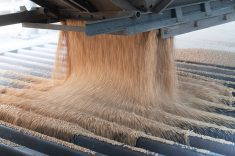The Canadian Grain Commission (CGC) is proposing to give farmers more flexibility when it comes to disputing grades and dockage assigned by licensed primary elevators.
Under Canada Grain Act regulations if farmers don’t agree with the grade and dockage the buyer assigns, the farmer can ask the CGC to determine it — a process referred to as ‘Subject to Inspector’s Grade and Dockage.’
The CGC’s determination is final and binding.
Currently the farmer has to decide at the time of delivery if they want the CGC to determine the grade and dockage. But since many farmers hire truckers to deliver their grain, the CGC is proposing giving farmers seven days to decide if they want the CGC to determine the grade and dockage.
Read Also

Tie vote derails canola tariff compensation resolution at MCGA
Manitoba Canola Growers Association members were split on whether to push Ottawa for compensation for losses due to Chinese tariffs.
If changes are made farmers and grain companies would have to agree on the location and timing of retained samples.
“We clearly have some logistical challenges on the way grain is marketed today and what the legislation might have contemplated when it was written originally,” CGC chief commissioner Doug Chorney said in an interview Dec. 15. “We want to have a system that is accessible and easy to use and solves some of these challenges that stakeholders have talked about when using the ‘Subject to Inspector’s Grade and Dockage’ process.”
Why it matters: The Canadian Grain Commission says it wants to make it easier for farmers to request the commission to provide grade and dockage if farmers don’t like the grade given by a licensed primary elevator.
The CGC’s dispute resolution process is a rapid and efficient alternative to farmers unhappy with a grade going to court, CGC spokesman Remi Gosselin said in an interview Dec. 15.
Farmers have until midnight Feb. 28 to submit their views (see ‘How to’ at bottom).
Any changes to the ‘subject to’ can be done through regulation, which is easier than amending the grain act.
During consultations earlier this year on the Canada Grain Act and the CGC, farmers expressed support for more flexibility around the CGC’s ‘subject to’ service, Chorney said.
“That was a common thread through many of the producer submissions — that there are some challenges with the current process,” he said.
The CGC saw an opportunity to address the issue ahead of possible changes to the grain act, he said.
“We don’t want to be standing still,” Chorney said. “We believe at the grain commission in continuous improvement and we believe this is a step in that direction to serve our stakeholders in an improved way. We haven’t got an absolute plan. That’s why we are consulting with time for people to submit their comments.”
About 250 farmers a year ask the CGC to determine the grade and dockage of grain they have delivered to an elevator, Chorney said.
That relatively small number could be because farmers fear upsetting their relationship with a buyer, Chorney said.
“I’m not saying that’s an easy thing to resolve, but it would be nice if people would not feel threatened by using the process,” he said. “It should be a process that is no different than any other where you do a cross-check to make sure things are going properly. It’s not about favouring an outcome for one party or another because this could go against the producer if they are given too high of a grade. It’s meant to make sure it’s fair.”
The CGC’s grade and dockage determination currently only applies to official grading factors, as defined in grain act regulations. The CGC says many farmers who submitted their views on the act earlier this year said they want the CGC to also determine non-grading factors such as falling number and DON (deoxynivalenol, also known as vomitoxin).
“We expect to develop a proposal on this in the coming year,” Gosselin said.
After consulting the industry not long ago the CGC opted not to add falling number and DON as grading factors in wheat.
Some respondents also suggested expanding CGC grade determinations to grain delivered to process elevators and grain dealers, rather than just primary elevators as is the case now.
The Western Grain Elevator Association (WGEA) understands why farmers want more flexibility given how the grain industry has changed, WGEA executive director Wade Sobkowich said in an interview Dec. 15.
WGEA members, who represent companies that handle most of the West’s grain, would welcome more clarity on how long to store samples of farmers’ grain, he said.
Farmers must sign declarations that they are not delivering unregistered varieties of grain. Grain companies keep samples to verify that, Sobkowich said.
The WGEA is determining its position on the CGC’s proposal and will submit its view before the deadline, he said.
How to provide input to the CGC
You have until midnight Feb. 28 to make your views known
The Canadian Grain Commission (CGC) is proposing changing Canada Grain Act regulations so a farmer can trigger a binding review of grade and dockage even if they are not present at delivery, as is currently required.
The CGC proposes that the farmer would have to request binding determination of grade and dockage within seven days of receiving a primary elevator receipt.
The CGC wants to hear the public’s views on its proposal.
Submit them in writing before midnight Feb. 28, 2022.
Email: [email protected]
Fax: 204-983-2751
Mail: “Subject to” proposal comments, Canadian Grain Commission, 600-303 Main Street, Winnipeg, Man. R3C 3G8
The CGC recommends including the following information:
- Full name
- Phone number
- Complete mailing address
- Email address
- The reason for the input
- Information on the organization you represent, if any
- Additional relevant information
If submitting a meeting request to provide direct input, provide the same information as above.
The CGC says it will summarize all input following the comment period.
To maintain confidentiality, names of individuals will be protected in accordance with the Privacy Act.
The CGC will publish a summary of what it heard.
It will consider and assess all feedback, including relevant legal and operational requirements, and the value-added potential for the grain sector, before any regulatory changes are made.















